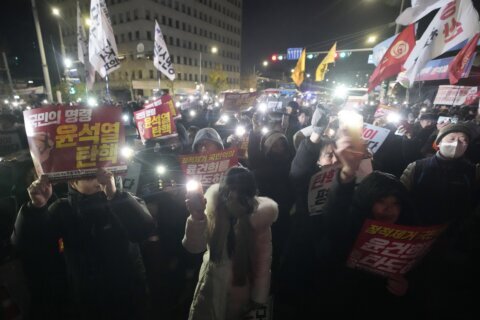JERUSALEM (AP) — More than two weeks after Hamas militants rampaged through a string of sleepy farming towns, many Israelis are furious at Prime Minister Benjamin Netanyahu’s government, not just for failing to prevent the attack, but for failing to come to their aid afterward.
While the military is launching unrelenting airstrikes in Gaza that have killed thousands of Palestinians, and hundreds of thousands of Israeli troops are massing for a possible ground offensive, government infighting and lack of help for those in need have left traumatized survivors to mourn on their own and volunteers — many of whom spent the past year protesting the government — to take on recovery efforts.
“It has to be clear. The government is completely incompetent,” said Ruvi Dar, a clinical psychologist and Tel Aviv University professor who has been counseling survivors evacuated from their homes.
“Any support that the refugees are getting right now is completely grassroots. Absolutely nothing by the state,” he said, adding that even volunteers’ hotel rooms are paid for by nonprofit groups.
The backdrop to the outcry is the long-running and contentious plan by Netanyahu and his far-right government to sharply curtail the power of the nation’s judiciary, which sparked months of protests and consumed the Cabinet and the nation.
Many believe the government neglected basic functions while it focused its efforts on attacking the Supreme Court, which it accused of being liberal and interventionist.
Critics have accused Netanyahu of recklessly ignoring a raft of issues. The police force is understaffed, and the military was caught off guard on Israel’s southern flank as forces were more heavily stationed in the occupied West Bank, home to half a million settlers. The government did little to address the spiraling cost of living and rampant killings in Israel’s own Arab communities, while ultra-Orthodox Jewish and pro-settlement coalition partners have received billions of dollars for pet projects.
“Government offices haven’t been functioning for a year now, so obviously they can’t cope with emergency situations. They wasted a whole year on nonsense,” Arnon Bar David, head of Israel’s Histadrut trade union, told Army Radio.
The government faced public wrath almost immediately after being caught by surprise by the Oct. 7 Hamas attack that killed more than 1,400 people, the vast majority civilians. It took hours for the stunned military to respond and send troops to counter-attack, a chaotic response that foreshadowed the government’s dysfunction.
Some government ministers have been blocked by residents from visiting attacked communities and others have been screamed at while visiting the wounded at hospitals.
Standing just feet from Economy Minister Nir Barkat, Ophir Shai’s eulogy for his brother, Yaron, turned into a furious attack on the government.
“You abandoned the soldiers of the IDF. You abandoned the people who live along the Gaza border. You abandoned the state of Israel. You abandoned my beloved brother. I expect you all to take responsibility and resign immediately after the war ends,” he said.
“I won’t forget, and I won’t forgive. I promise to hunt you down forever.”
Even after the initial massacre, the government was slow to respond and appeared in disarray. Israel’s public diplomacy minister, meant to serve as a spokeswoman to the international media, quit in a huff after her responsibilities were turned over to other ministries.
Polls show Netanyahu’s already plunging popularity has collapsed. While other members of the government and the heads of the army and the Shin Bet security service have apologized and taken responsibility for the attack, Netanyahu said nothing of the sort for weeks. Only Wednesday night, 18 days after the attack, did he come close to accepting some responsibility.
“This failure will be investigated thoroughly. Everyone will need to provide answers, myself included, but all of this will happen only after the war,” he said in a brief nationwide address.
Netanyahu also boasted of government assistance for victims, including mass evacuations from hard-hit border communities. “We will not leave anyone behind,” he said.
But Netanyahu has not publicly visited the wounded in hospitals, consoled traumatized evacuated families or gone to a funeral for any of those killed. He has made several public statements, mainly as he greeted world leaders offering support, and he has visited soldiers in the field. But he has not taken questions from Israel’s famously combative media.
Asked for comment, a senior Israeli official said the prime minister “met with families and is fully focused on winning the war.” The official spoke on condition of anonymity because he was not authorized to talk to the media.
With over 200 people being held captive by Hamas militants in Gaza, he did not meet with any of their families until more than a week after the attack — two days after U.S. President Joe Biden spoke to families of U.S. citizens being held.
Meanwhile, Israeli media has reported about a string of government turf wars holding up assistance to victims’ families and evacuees displaced from their homes.
For two days after the attack, “the government wasn’t functioning. We didn’t get any help,” said Yossi Keren, who became head of the regional council in Sha’ar HaNegev, where many of the attacks took place, after his predecessor was killed confronting Hamas gunmen.
Most residents have evacuated, and their needs — everything from getting schooling for children to replacing computers families left behind — are enormous, he said. The government response is slowly getting better, though he remains wary.
“If the government won’t step in, the crisis will be bigger. Much bigger,” Keren said.
Danny Danon, a senior member of Netanyahu’s Likud Party, acknowledged the government’s shortcomings.
“The government agencies were not capable of dealing with the numbers. So it took them some time to come back and to set up and provide the proper services,” he said. “Certainly it’s legitimate for the families to express their pain and criticism.”
He said there would be an inquiry into what went wrong after the war, but right now Israel must remain focused on defeating Hamas. “Netanyahu is very mission-oriented now in the war effort,” he said.
Gideon Rahat, a political science professor at Hebrew University, said the dysfunction was a result of a bloated, divisive government that demonized and then pushed out many respected bureaucrats who would have been competent to handle an emergency.
“When you are a populist government and all you do is talk and tweet and write posts instead of doing real things, when you are needed you don’t know what to do,” he said.
That vacuum in the current crisis has been filled by the government’s sworn enemies, opponents of the judicial overhaul who had mobilized tens of thousands of protesters for weekly demonstrations against the overhaul plan.
Less than 12 hours after the Oct. 7 attack, they sent teams of medical volunteers to hospitals to help with the wounded and deliver food to their families, said Oren Shvill, one of the group’s organizers. The next day, they started evacuating families and pairing them up with host families.
“Really fast, we managed to transform our organization from protesting to civilian aid,” he said. ”Everything we asked for, people just jumped on the mission.”
Now, they have 15,000 volunteers a day coordinated from logistics centers in Tel Aviv, near Gaza and in the north, where the army is fighting Hezbollah militants in Lebanon, he said. And they’ve been lauded as heroes in Israel.
They helped locate missing people; sent equipment to soldiers called to the Gaza border; shipped donated food, clothes, toys and medicine to the evacuees; and began coordinating an informal public relations operation for the country, Shvill said. They sent teachers and therapists to the evacuees’ hotels and set up operations there to answer their questions.
This week, they began sending volunteers to milk cows, pick tomatoes and cucumbers and plant potatoes at abandoned farms in the south.
“Everything we are doing should have been done by the government,” he said.
___
Associated Press reporter Julia Frankel in Jerusalem contributed to this report.
___
Find more of AP’s coverage at https://apnews.com/hub/israel-hamas-war
Copyright © 2024 The Associated Press. All rights reserved. This material may not be published, broadcast, written or redistributed.






